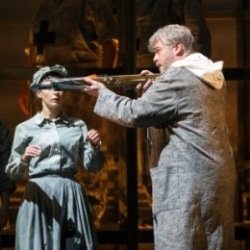William Tell (Welsh National Opera – tour)

© Richard Hubert Smith
I’ll admit I was secretly hoping that the extensive ballet-music might have been trimmed as part of the pruning process, but as it turned out Amir Hosseinpour‘s hyper-virtuosic and often disturbing choreography was one of the evening’s highpoints. The near-the-knuckle fertility rites at the act one wedding caused a few intakes of breath, and the sexual humiliation of Swiss women by Austrian officers later on almost warrants a trigger-warning; but the fourth-act dance-off from Kit Brown, Nicolas Keegan and Pim Veulings was a thrilling counterpart to the vocal fireworks on display elsewhere.
Dramatically speaking, only the climactic scene in which Tell shoots an apple from his son’s head at Gesler’s command falls a little flat. It would, of course, be unreasonable to expect the baritone singing Tell to also be a top-class marksman, but the arrow being passed in slow-motion along the line of female bystanders did seem a rather damp squib of a solution.
WNO regular David Kempster excels in the title-role: especially touching in the domestic scenes, his Tell is very much an ordinary bloke placed under extraordinary pressures and acting on Edmund Burke’s maxim about evil triumphing whilst good men do nothing. The coiled energy of ‘Sois immobile’, as he entreats his son to stay still during the shooting-trial, was genuinely nailbiting; he’s surely done nothing better for the company. He also has an excellent rapport with Fflur Wyn in the trouser-role of his son Jemmy, convincingly boyish in overalls and cropped hair, and packing quite a punch when riding on top of the big ensembles.
'manifestly the most challenging role of Barry Banks's career'
Statuesque and suitably patrician in her forest-green hunting-costume, Gisela Stille sings with commensurate poise and nobility as the Hapsburg princess Matilde, but the real honours go to Barry Banks, proving himself to be a true king of the high Cs in the punishing role of Arnold – manifestly the most challenging role of a career spent singing high-wire roles. Yet he sounded capable of doing the whole thing twice over, and the authority and sheer fearlessness of his singing easily overcame some rather unheroic costuming.
If the Swiss contingent rarely shout their heroism from the mountaintops, their Austrian oppressors go to town on the pantomime villainy, all storm-trooper uniforms and evil-looking stag-antler helmets. Fresh from playing another baddie in the previous night’s Moses in Egypt, Nicky Spence sets the tone in Act One when he arrives to apprehend Leuthold’s murderer, newly dramatic voice gleaming like his chrome armour. The good-natured boos at curtain-call were well deserved, as were those for his boss: shaven-headed, toothless and wheelchair-bound, Clive Bayley‘s deliciously creepy Gesler is part Dr Strangelove, part Bond villain (at one point I half expected the surtitles to read ‘No, Mr Tell – I expect you to die’), his cavernous bass glinting with malice as he fondles the potentially fatal apple.
The WNO Orchestra, particularly its indomitable horn section. was on tip-top form from the barnstorming overture (which rightly earned thunderous applause) to the transcendent finale. One of the best things the company’s done in recent years.










